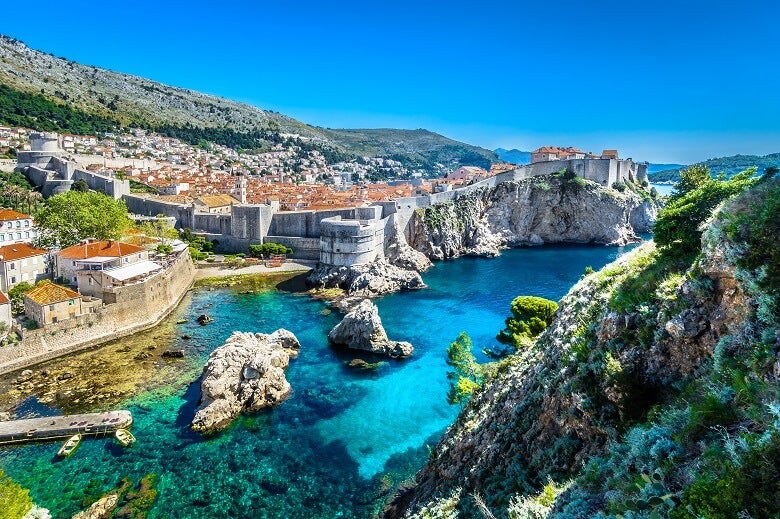Healthcare in Croatia
Life moves at a relaxed pace in Croatia, with quaint towns lining the breathtaking coastal views. Plus, if it’s island living you’re looking for, Croatia boasts more than 1,000 of them dotted around the mainland.
Sounds somewhat idyllic, doesn’t it? And to top it all off, expats in Croatia will also benefit from the country’s efficient healthcare system, which is accessible to all residents. But, of course, that isn’t your only option – we’ll guide you through the rest in this very article.
If you’ve already decided that private health insurance is sensible before your move to Croatia, check out our list of recommended healthcare providers. From there, you can request free quotes from whichever company suits your needs.
Croatian healthcare: Key facts
- 0% of people with private healthcare
- 0Number of doctors per 1,000 people
- 0Average life expectancy
What’s on this page?
01 | An overview of Croatia’s healthcare system
02 | Private healthcare in Croatia
03 | Cost of health insurance in Croatia
04 | Next steps
An overview of Croatia’s healthcare system
Croatia has a universal healthcare system put in place to help its citizens stay in tip-top shape. All residents in the country are required to be covered by a basic health insurance plan called ‘obavezno’ (this translates to English as ‘required’), which makes sure everyone in Croatia has access to basic primary care.
To support the healthcare system, residents are expected to make contributions each month. There are, however, a few categories exempt from contributing, including:
- Anyone under the age of 18
- People with residency in Croatia that are incapable of independent life
- Children of dependents that are incapable of independent life
- Family members of dead or missing Croatian armed forces members and disabled members of Croatian armed forces
You should also note that residents are unable to opt out of the healthcare system, unless they plan on upgrading to private health insurance.

A view of the crystal clear seas in Dubrovnik – a city in Croatia, famed for its Old Town, enclosed with distinctive stone walls
Is healthcare free in Croatia?
Unfortunately, healthcare isn’t free in Croatia. So if you’re moving here from the UK, it might take some getting used to. Treatment is, however, heavily subsidised. This means that even if you need emergency care, an operation, or even just to visit your GP, you won’t have to fork out a hefty sum.
For any treatment you receive, you’ll need to make a co-payment of 20% of the cost. The maximum fee for a single treatment is 2,000 Croatian kuna (£239), with obavezno covering the other 80%. To cover co-payments, some Croatians – such as students, disabled residents, or low-income households – are able to take out supplementary health insurance with the Croatian Institute for Health Insurance (HZZO).
Overall, out-of-pocket payments – excluding voluntary health insurance – accounted for 10.5% of Croatian health expenditure in 2017. This figure was well below the EU average of 15.8%.
How good is healthcare in Croatia?
Expats will be pleased to hear that the overall standard of healthcare in Croatia is generally pretty good. In fact, The Lancet ranked Croatia 30th out of 120 countries in its study of the best healthcare systems around the world.
Plus, according to the European Commission, self-reported access to healthcare is of a good standard, with low unmet needs for medical care. There is, however, a substantial difference in satisfaction rates between low- and high-income groups. Unmet needs also tend to be high among older people and those in less built-up areas.
But, despite its ranking, Croatia is still working to further improve its healthcare system. Like most countries, the public healthcare facilities in Croatia tend to have longer waiting times compared to private facilities. To combat this, the Croatian government implemented a national hospital plan between 2015 and 2016, which aimed to improve effectiveness and efficiency within all public facilities.
The government also spends 8.3% of its Gross Domestic Product (GDP) on healthcare, according to Statista, which is an encouraging level of expenditure.
Healthcare in Croatia for foreigners
As mentioned above – and seconded by the UK Government – if you’re planning on living in Croatia for more than three months, you must register as a resident.
As a resident, you’ll then have to pay health insurance contributions to the Croatian Health Insurance Fund (HZZO), which funds the country’s healthcare system.
This will allow you full access to the public healthcare system.
Healthcare in Croatia after Brexit
Brexit was a momentous event, and has had an enormous impact on travelling and living in Europe – but thankfully, you can still access Croatia’s public healthcare system.
Typically, these are the three ways that UK expats access Croatian healthcare:
- Register as a resident and contribute to HZZO
- For shorter stays, use a European Health Insurance Card (EHIC) or a UK Global Health Insurance Card (GHIC)
- Register a UK-issued S1 form with HZZO
If you plan to stay in Croatia for longer than three months, you must apply for a residence permit.
You’ll receive a letter showing that you’re in the process of applying to be a resident, which you must take to your local HZZO office within eight days. There, you can register to start paying health insurance contributions.
If you’re employed or self-employed, you’ll pay monthly amounts based on the average Croatian salary, which are taken from your earnings by your employer or accountant.
If you’re unemployed, you’ll have to give HZZO an annual payment of €700.
Next, you’ll receive a letter that confirms you have health insurance, and an insurance card too, within the next three months. Just show the letter if you need healthcare before the card arrives.
Make sure your dependents are also registered with HZZO. If you have children, register them with a HZZO paediatrician or GP.
If you’re sent to Croatia as a temporary, posted worker, you can access healthcare services by using an EHIC, GHIC or S1 form.
Is Croatia covered by the European Health Insurance Card?
Since Croatia is part of the EU, the European Health Insurance Card (EHIC) is valid in Croatia.
Therefore, if you’re a citizen of an EU country and are planning to move to Croatia, we would highly recommend that you get an EHIC.
This will allow you to receive healthcare throughout the EU.
Private healthcare in Croatia
Do you need health insurance in Croatia?
All Croatian residents are required to have some sort of health insurance, and there are three types you can choose from:
- Obavezno zdravstveno osiguranje – This is mandatory for all residents, and is prescribed by the state agency HZZO
- Dopunsko zdravstveno osiguranje – This is an optional health insurance supplement that you can get from either HZZO, a private bank, or an insurer. It’s affordable, and eliminates most co-payments for primary care hospital visits
- Dodatno zdravstveno osiguranje – Dodatno is the highest level of health insurance in Croatia, and is only offered by banks and private insurers. This private healthcare option usually covers specialists, additional treatments, preventative care, laboratory tests, and extended hospital visits
Although public health insurance is mandatory in Croatia, some people still opt to go private because of the additional benefits it has to offer.
Benefits of private medical cover
- Shorter waiting times
- Private hospital rooms
- Better quality of facilities
- Dental care (not typically covered by public health insurance)
- Ability to select your doctor or surgeon
Currently, around 18% of people in Croatia have private health insurance (‘dodatno‘).
If you think these benefits suit your needs, or expect they will in the near future, check out our list of recommended healthcare providers. From there, you can request free quotes from whichever company suits your needs.

The sunset – adorned with city lights – reflecting in the calm waters of Split’s harbour
Cost of private healthcare in Croatia
How much is public health insurance in Croatia?
The price of state health insurance in Croatia will depend on your circumstances. We’ve listed a few of the main price brackets below to give you a rough idea of how much you’re likely to pay.
- Unemployed in Croatia, but don’t claim benefits – This situation covers a good chunk of the foreigners living in Croatia, perhaps because this is an excellent location for retired expats. In this case, the standard rate of healthcare is 550 kuna (£65) per month
- Employed by a Croatian company – If you are an employee in Croatia, your company is required by law to pay for your obavezno health insurance as part of your salary. The cost of your health insurance is calculated based on how much you earn. In terms of salary, there is ‘neto’ and ‘bruto’. Neto salary is the net amount you get paid into your bank account each month. Bruto salary is the amount you receive, plus taxes and pension.
- An EU citizen – If you are an EU citizen that is no longer paying into the state health program in your home country, then you must start a new policy with HZZO. You will pay 550 kuna (£65) per month.
- You are unemployed and collect unemployment benefits – Unemployed people can request that their HZZO health insurance premium be covered by the state only if they notify HZZO within 30 days of losing their job. This only applies if you lose your job at a Croatian company.
How much is private health insurance in Croatia?
Although all Croatian residents are covered by public health insurance, private healthcare is likely to give you much more in-depth cover overall.
As a broad overview, the cost of private health insurance in Croatia could range from anywhere between 500 and 7,000 kuna (£59 – £838) each year – and sometimes even more. So, opting for private health insurance can put you out a few thousand more than the public health insurance option.
Unfortunately, it’s difficult to estimate how much private health insurance will cost you, since it is entirely dependent on your personal circumstances. Factors that can impact the price of private medical cover include:
- Age
- Health factors
- Gender
- The type of cover you get
- Which insurance company you opt for
Keep in mind that these prices are just averages. To find out exactly how much private medical cover will cost you in Croatia, check out our list of recommended healthcare providers. From there, you can request free quotes from whichever company suits your needs.

